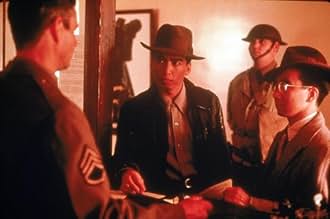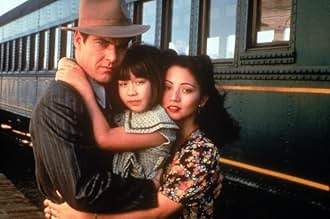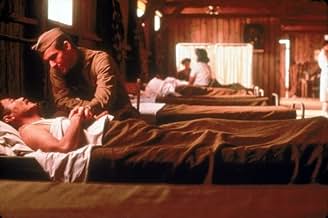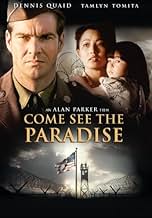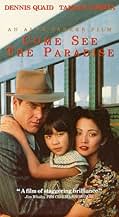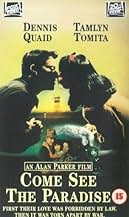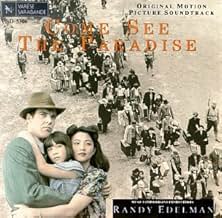Füge eine Handlung in deiner Sprache hinzuThe passionate romance between an Irish-American man and a Japanese-American woman is threatened when the Pearl Harbor attacks happen and the woman is forced into a prison camp because of he... Alles lesenThe passionate romance between an Irish-American man and a Japanese-American woman is threatened when the Pearl Harbor attacks happen and the woman is forced into a prison camp because of her ethnicity.The passionate romance between an Irish-American man and a Japanese-American woman is threatened when the Pearl Harbor attacks happen and the woman is forced into a prison camp because of her ethnicity.
- Auszeichnungen
- 3 Nominierungen insgesamt
Empfohlene Bewertungen
The movie moves deliberately. It takes its time to show the cultural differences and give the romance some space. It's a bit slow but it works as an old fashion romantic film. It doesn't really heighten the drama more than a simple melodrama level. The running time is over two hours long and probably would work better with less. This starts as a fine love story about Jack and Lily but that drama fades into the background in the second half. The camp part of the movie becomes more about telling different aspects of life through the family members.
The movie itself is centered around a cliché, star-crossed love story, leaving the majority of the historical features of the film as bits and pieces that are seemingly tacked on to give the film its validity. More than half of the film is spent on (albeit, poor) character development and introduction of the main conflict. As a result, the parts of the film that deal with internment and other injustices faced by people of Japanese descent are framed inherently as secondary aspects of the story. Internment and relocation were used as plot devices. Tense racial and/or ethnic conditions within camps and society are played down to make Jack and Lily's love more plausible. In many cases, Nisei and Issei were faced with systemic and often violent anti-Japanese sentiments that posed threats to personal wellbeing. In the camps, conditions were unsanitary and, due to the material losses some people suffered when forced to leave their houses so quickly during the relocation process, many internees were not able to afford appropriate medical care. This aspect is largely glossed over in the movie depiction.
While I can go on about the issues I have with this film, I do believe it does a decent job of highlighting some of the important aspects of this period of history. Through the plot, Parker addresses the paradox of citizenship and loyalty, as well as other injustices and racism faced by the Japanese community during the 1930s and 1940s. Before World War II, people of Japanese descent were prevented from receiving citizenship by US immigration policies, but during internment, these people were also asked to swear loyalty to the United States, effectively challenging their identity as either Japanese or American. Similarly, there is some mention of the racism experienced by Nisei and Issei during this time, but it is often more generalized and even misguidedly incorporated into the screenwriting itself.
Come See the Paradise walks the fine line between being historically valuable, and unfortunately frustrating to watch. What it lacks in historical accuracy, it makes up for in typical, sappy, Hollywood romance. This film could not be confused with a documentary, but for those seeking an interesting movie to watch, this is a decent choice if taken with a grain of salt.
Like many films, "Come See The Paradise" is about the strength of love. The fact that it uses this period as a backdrop sets it apart from the rest. The chemistry between Quaid and Tomita is amazing. Just watch them together when they meet for the first time and they kiss. It's simply stunning. Quaid has rarely been this good, and Tomita is obviously relishing having a lead role. In most of her films she's listed as "(somebody's) wife". Films like this and "The Joy Luck Club" prove that she is one of the most talented and under-used actresses.
Some have complained that this film uses an "American" character to tell the story of a "Japanese" family. As if any non-Japanese audience members would not be able to understand, or relate to, the Japanese family. The Quaid character is called "un-American" because of his labor rights stance. The family is called "un-American" simply because they are of Japanese descent. Even though the children were born in the United States. So what exactly does it mean to be "un-American"?
Side note: this movie has not been released on DVD. I anxiously await that day.
I find the first half an hour or so unnecessary. You are introduced to a Japanese family and their business, and Dennis Quaid's character. His character is actually pretty unnecessary in the movie. He does not really contribute anything to the plot besides being married to a japanese girl. Of course, this was rather odd at the time since the Japanese were considered the enemy, but that is pretty much it in my opinion. The movie could have retold the exact same story and saved us about 45 minutes in telling us about Japanese internment without the use of his character. THis is not to say the movie is bad, but it is pretty long for no reason other than to include an american that you are supposed to be inclined into liking.
Wusstest du schon
- WissenswertesThe movie ranks at the No. #1 spot on the top 10 list of most Oscar-bait movies ever made according to research by UCLA sociologists Gabriel Rossman and Oliver Schilke. According to website 'Wikipedia', this movie is "the most deliberate example of Oscar bait in their study of 3,000 films released since 1985. The identification is based on various elements calculated to be likely to draw Oscar nominations, including the previous nominations of [Alan] Parker, the film's setting in Hollywood (including Quaid's projectionist character), and its depiction of a tragic historical event against the background of war and racism. It was only released in a few cities during the last week of that year to make it eligible for the awards. However, it was not nominated for any Oscars and failed at the box office".
- PatzerDuring the destroying Japanese businesses scene, the "I am an American" sign is printed as if from a professional printers, however, it's entirely possible that people had signs professionally printed.
- Zitate
[first lines]
Older Mini McGann: Why are we so early?
Lily Yuriko Kawamura: It's good to be early.
Older Mini McGann: Do you ever worry that you won't recognize him, Mama?
Lily Yuriko Kawamura: You recognize me, don't you?
Older Mini McGann: Well, he might have grown a beard or a moustache or something. And I was so little. I only think I remember him. Do you think he'll remember me?
Lily Yuriko Kawamura: Well, he has all your photographs and all the letters you wrote him, and he has all your school reports
Older Mini McGann: You sent him my school reports?
Lily Yuriko Kawamura: Of course I did. I wanted to let him know how well you were doing. Come on, now. I got some tea and rice cakes here. We'll have a nice talk while we're walking, okay? Let's go.
Older Mini McGann: How far do we have to walk?
Lily Yuriko Kawamura: Not far.
Older Mini McGann: If we have so much time, then why are you walking so fast? I shouldn't have worn these new shoes. I think I have a blister. Mama!
[speaks in Japanese]
Lily Yuriko Kawamura: [replies in Japanese] Try not to think about it. You want to look pretty, don't you?
Older Mini McGann: Can we talk about Papa?
Lily Yuriko Kawamura: Okay.
- Crazy CreditsThe 20th Century Fox logo does not have the fanfare on it.
- SoundtracksKawamura Family Theme
Written by Jake Parker and Alan Parker
Top-Auswahl
- How long is Come See the Paradise?Powered by Alexa
Details
Box Office
- Budget
- 17.500.000 $ (geschätzt)
- Bruttoertrag in den USA und Kanada
- 947.306 $
- Eröffnungswochenende in den USA und in Kanada
- 65.532 $
- 25. Dez. 1990
- Weltweiter Bruttoertrag
- 947.306 $
- Laufzeit
- 2 Std. 18 Min.(138 min)
- Farbe
- Sound-Mix
- Seitenverhältnis
- 1.85 : 1


